Wed 9 Mar 2022
A Western Movie Review by David Vineyard: BROKEN LANCE (1954).
Posted by Steve under Reviews , Western movies[12] Comments

BROKEN LANCE. 20th Century Fox, 1954. Spencer Tracy, Robert Wagner, Jean Peters, Richard Widmark, Katy Jurado, Eduard Franz, Hugh O’Brian, E. G. Marshall, Earl Holliman, Carl Benton Reid. Screenplay by Richard Murphy based on the screenplay for House of Strangers by Philip Yordan. Director: Edward Dmytryk.
By 1954 when this drama of a family in conflict and brothers at each others throats was made, the Western was the dominant form of entertainment in theaters around the country, and the simple morality plays of an earlier era had been replaced with far more complex and adult themes. Novels, histories, and original screenplays were being churned out in great number and it was perhaps natural that Hollywood would turn to its own products for the basis of new material for the seemingly endless demand for new Westerns.
It had already begun in the Post War-era. Raoul Walsh remade his own High Sierra as Colorado Territory, John Ford’s Four Men and a Prayer was remade as Fury at Furnace Creek, Kiss of Death as The Fiend Who Walked the West, Objective Burma as Distant Drums, and soon Asphalt Jungle as Badlanders, The Lost Patrol as The Last of the Comanches, even Gunga Din as Sergeants 3.
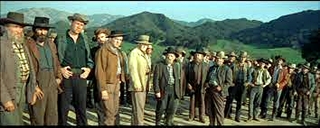
Broken Lance was a remake of Joseph L. Mankiewicz’s 1949 film noir House of Strangers. In that one Edward G. Robinson was the patriarch of an Italian banking family whose favorite son, Richard Conte who loves society woman Susan Hayward, goes to jail to save the old man when he gets in trouble with his high-handed ways only to find his brothers led by Luther Adler out to destroy him and cheat him out of his part of the family fortune when he finishes his prison term.
Here Spencer Tracy is Matt Devereaux, cattle rancher and pioneer who has died while his youngest son Joseph (Robert Wagner) was in prison. Joe’s half brothers Ben, Mike, and Denny (Richard Widmark, Hugh O’Brian, and Earl Holliman Jr.) try to buy him out and send him packing when Joe is released, but Joe still has business and memories to deal with.
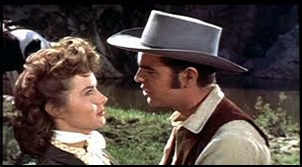
The movie opens with a lobo wolf running wild across the landscape. We will later see Matt refuse to let son Denny shoot the same wolf, and at one point Matt’s Native American foreman (Eudard Franz) tells Joseph that Matt’s spirit runs with the wolves. We see and hear the wolf a final time as the music rises and The End appears hammering home the theme.
The story is told in flashback, and to Mankiewicz’s plot, Dmytryk and screenwriter Richard Murphy add a sub plot about racism and intolerance since Wagner’s Mother (Katy Jurado, who was only six years older than Wagner) is Native American, a source of many not so subtle snubs from Matt’s business partners..
When Old Matt takes on a copper mine poisoning his source of water and destroys the place he finds his friend the territorial governor (E. G. Marshall — and yes the film several times refers to Arizona as a state well before that happened) is unwilling to help him unless he stops Joe from romancing his daughter Barbara (Jean Peters).
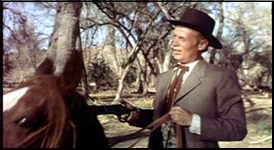
The legal proceedings go badly and Joe volunteers to go to prison to save his father striking a deal to only serve a short sentence if Matt will sell the land to the copper interests, but when the time comes older brother Ben refuses to sign, Joe is sent to prison for three years, and Matt has a stroke confronted by Ben and his brothers refusal to help Joe.
While Joe is in prison the brothers undo everything Old Matt built and eventually cause his death in a well done scene reminiscent of the end of El Cid. But Joe wants no part of fratricide having said his goodbyes to his dead father and is ready to leave when Ben decides he would never sleep well as long as Joe was alive and decides to kill him.
Beautifully shot by cinematographer Joe MacDonald, with a strong score by Leigh Harline, and imaginatively staged by director Edward Dmytryk, Broken Lance is a satisfying adult Western with the shoot ’em up action nicely balanced by family drama, a trial, and Tracy in larger than life scene stealing mode (there are two life sized portraits of Tracy featured in the film I would kill to own).
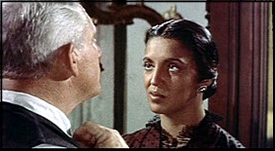
An avid polo player when he was younger Tracy sits a horse well and looks natural in the saddle. At this point he was still active enough to look believable in action scenes.
Widmark is good (when isn’t he?) as Ben the resentful older brother who hates his father enough to destroy every thing and everyone around him including his half brother. O’Brian and Holliman fill out the roles of the two wastrel middle brother well enough though neither has much to do.
Of course Katy Jurado is fine in anything she plays and in this period has one fine role after another. Eduard Franz plays Old Matt’s Native foreman and surrogate father to Wagner’s character with his usual quiet efficiency (he plays a similar role as a tracker in The Burning Hills). Peters, Marshall, Reid are all solid in their various supporting bits as well.
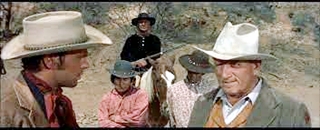
The star here though, despite Tracy’s top billing, is Wagner, who is in almost every scene as the decent loyal son, and holds his own opposite the likes of Tracy (Wagner knew many of the Old Hollywood elites well, including Tracy who he had caddied for when he was younger) and Widmark. He played opposite O’Brian in The White Feather, so this was old home week in some ways.
It’s no easy task for a young actor to even stay on the screen with the likes of Tracy (they played brothers in The Mountain) and Widmark, but he does it with ease. He was always at ease on screen, perhaps too much so for his own growth as an actor, but here he more than manages the unenviable trick of having to hold the screen when viewers are waiting for more of Tracy and Widmark.
Incidentally there is a quiet scene with Tracy and Widmark that is almost a masterclass in two screen naturals subtly battling for screen dominance and coming to a draw without either of them ever once slipping out of character or crossing the obvious line into scene stealing. Widmark’s quiet self assurance on screen with Tracy, expressed in his relaxed posture, even adds to the tension between their characters in the film.
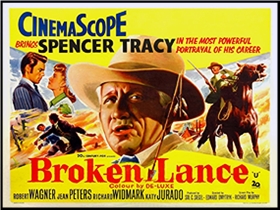
March 9th, 2022 at 2:26 pm
From Wikipedia: “Katy Jurado was the first Latin American actress nominated for an Oscar, as Best Supporting Actress for her work in Broken Lance (1954), and was the first to win a Golden Globe Award, for her performance in High Noon (1952)”
and
“The film won the Oscar for Best Story for Philip Yordan.”
and, FWIW
“… the Phillip Yordan screenplay [was] based upon the novel I’ll Never Go There Any More by Jerome Weidman.”
March 9th, 2022 at 7:43 pm
A wonderful western review.
The film itself: casting alone makes the movie rewarding, even for a few minutes of viewing.
Unfortunately for me I was never able to sit through it for very much longer than that. Found it too …talky?
1) Too many characters to keep track of. Why does there need to be three brothers? It should have just been one: Widmark.
Not three, plus a salt-of-the-earth cattle foreman, Jean Peters’ heartfelt character, Katy Jurado’s heartfelt character, EG Marshall’s heartfelt character. Too much movie in this movie.
Earl Holliman and Hugh O’Brian …(especially Holliman), were unconvincing [to me] as bad guys.
Wagner: I always like Wagner but I like him best when –like Redford –he harpoons the kind of shallow cur blessed with their own good looks. Wagner and Redford are marvelous as villains.
Here in this role –Wagner is a faultless good guy –that handsome jaw of his righteously jutted out in every scene –and it leaves me flat. He’s just TOO good.
I wish the whole film had been shot thirty years earlier with Tracy in the role of the wronged son. (As the review explains, yes –it was shot earlier –but with Eddie G).
Objectively I agree with the film as summarized; objectively I agree with the power of all these great stars. And the deft of the director and DP.
But privately, I know from experience that I clicked away many times from this movie whenever it came my way on late night TV. Not enough bone-crunching, groin-kneeing action for me.
(Didn’t Jimmy Stewart do a similar film ‘Broken Arrow’? Same situation.)
Instead, I might accidentally have watched/enjoyed a flick like ‘Firecreek’, ‘Welcome to Hard Times’, or ‘There Was a Crooked Man’.
“Broken Lance” has a Shakespearian feel to it. Not that there’s anything wrong with that.
Again: fun film history, and fun film to read about, presented as finely as was done above. I wonder if that Widmark/Tracy scene is free to watch online…
March 9th, 2022 at 8:08 pm
Maybe KING LEAR?
March 9th, 2022 at 9:09 pm
I thought I posted a review of I’LL NEVER GO THERE ANY MORE by Jerome Weidman here a while back, but I can’t find it now. I’ll send it off to Steve just in case I remember wrong.
March 9th, 2022 at 9:59 pm
I’m sure I remember reading it, but I can’t find it posted here, either. Dan just sent it to me again now, and I’ll get it posted here first thing tomorrow.
March 9th, 2022 at 10:28 pm
I had completely forgotten STRANGERS was based on a Weidman novel.
Dan, look forward to your review.
Lazy, BROKEN ARROW is based on the true story of Tom Jeffords (Stewart) an Indian Agent who befriended Apache chief Cochise as told in the novel by Elliot Arnold.
You may be thinking of RED RIVER which has a generational clash between John Wayne and Montgomery Clift, but frankly the theme of the cattleman at odds with his children is pretty common.
There is Alex Nichol as the ungrateful brute son of Donald Crisp in Stewart’s THE MAN FROM LARAMIE, Brian Keith as Edward G. Robinson’s evil brother in THE VIOLENT MEN, Barbara Stanwyck’s Freudian daughter to Walter Huston in THE FURIES, Gary Cooper and evil uncle Lee J. Cobb in MAN OF THE WEST. weak son Dennis Hopper killed by his corrupt father James Gregory in SONS OF KATIE ELDER, John Cassavettes vs older brother Robert Taylor in SADDLE THE WIND betraying Donald Crisp, Dennis Hopper again as R.G. Armstrong’s psychotic son in FROM HELL TO TEXAS, and evil Robert Walker vs Burt Lancaster and their surrogate father Ray Collins (Donald Crisp needed a day off) in VENGEANCE VALLEY.
It’s fairly common in Mob movies as the theme too.
Compared to many others BROKEN LANCE is a talkie adult Western. It’s based on a talkie film noir and the plot depends more on tension between the main characters than on action.
Hugh O’Brian played many villains before hitting it big on television with THE LIFE AND LEGEND OF WYATT EARP. He’s a bad guy in the above VENGEANCE VALLEY as a matter of fact, a would be rapist. In fact he seems to have played mostly villains prior to EARP despite his good looks.
Holliman specialized in comedy relief (FORBIDDEN PLANET), simple minded but soulful (THE RAINMAKER), and downright mean in that era of his career. He was quite good as a psycho killer with a kink with Lee Marvin in THE BIG COMBO torturing hero Cornel Wilde and coldly murdering Brian Donlevy.
March 10th, 2022 at 12:12 am
I’ve seen this film 3 times according to my notes in Brian Garfield’s book, Western Films and enjoyed it more each time. I now consider it an outstanding western that makes the TV show Bonanza look rather silly with the 3 brothers and the father acting so super good in the TV drama.
March 10th, 2022 at 9:33 am
That’s a lively round-up of western titles above (in #6) and ably proves the point at hand.
Now, I’m trying to recall if I’ve ever encountered a western film which –at one and the same time –I might consider ‘a bit too talky’ –but which I also stuck with viewing all the way through.
‘Broken Lance’ does compensate for talkiness with solid acting from some of my favorite players. Not to mention, earnest young Wagner and luscious Jean Peters.
But I don’t know if I can name too many others. Some of the titles cited above, I recall receiving without much inspiration.
There are players who can carry a poor script on their backs –Cooper, Stewart, Tracy, plenty of others. ‘Broken Arrow’ is one of the rare Jimmy Stewart films which I found a little too flat to evoke interest. Stewart is almost always worth watching no matter what you find him in …but sometimes when you’re in the mood for a western, you just want galloping hooves, mesquite, and sunsets and not acting. Other times, you groove on a stage veteran’s performance. Viewing habits fluctuate.
Since I’m not a historian, the result in me is that I’m a ‘prisoner to my perceptions’. I happen to have seen Hugh O’Brian mostly play good guys so that’s my very-much-mistaken impression of him. The actuality is (as stated above) he was well-versed in either capacity. I’m glad to learn of it.
It’s amusing and diverting too, for me to try to imagine Earl Holliman as a baddie. I may have seen ‘Big Combo’, maybe not, maybe I’m just forgetting his key scenes. In other roles, Holliman sure had that “simple-hearted country boy” schtick down pat. That long face and twangy drawl of his.
Much love too, for ‘Red River’. Hope I’m never wifty enough to confuse that gobstopper with anything else. Now, there’s a production which had it all. Visual spectacle, story, acting. Entertaining from every angle.
Good stuff!
March 10th, 2022 at 5:20 pm
I always think of THE BIG COUNTRY as a talkie Western, or to some extent HONDO, and certainly the Burt Lancaster THE UNFORGIVEN. BROKEN LANCE is a bit different in being an interior Western what with the big trial and scenes in the family home.
I never argue with how anyone feels about a film, and I can be bored if I tune in wanting a shoot ’em up and get a drama.
I can think of one, YELLOWSTONE KELLY, that disappointed me, and I loved the Clay Fisher/Will Henry book. It just felt like nothing much happened then it was over.
But talky depends on the talk and talkers. In the cases above both were superior. I’ll admit I like BROKEN LANCE more each time I see it as Walker says of his viewing.
March 10th, 2022 at 7:10 pm
Another candidate: “The Ox-Bow Incident”. Gobs of acting to the exclusion of most other values, but I watch riveted by every scene.
March 13th, 2022 at 3:26 pm
[…] posts have seen coverage of The Steel Key (1953) by David Friend, and Dave Vineyard has reviewed Broken Lance (1954) and Rio […]
March 15th, 2022 at 12:02 pm
I saw this one with my dad just the other day when it aired on the British television channel Talking Pictures TV!
Is that a coincidence, David, or did you catch it there too?